| BACKGROUND
SCREENING NEWS |
Results
of the 2012 Employers Background Screening Practices Survey
and Summary of Trends Since 2008
The 2012
Employers Background Screening Practices Survey was conducted
at the 2012 SHRM Annual Conference held on June 25 - 27th,
in Atlanta, GA at the exhibit booth of PreemploymendDirectory.com.
Human Resource professionals that visited our booth were asked
to participate in the survey and to complete the questionnaire.
In addition, a post card mailing was conducted to the pre-conference
attendee list which directed attendees to an online version
of the same survey. We received a total of 325 people completed
surveys.
While this
survey does not rise to the level of being statistically significant
we believe it offers some key insight on how background screening
service providers from the end users perspective.
To read
the survey results, click
here
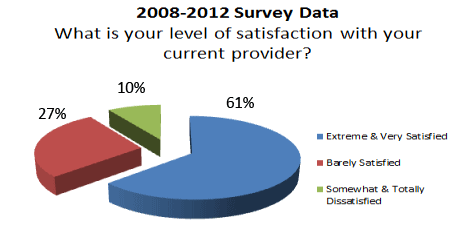
The range
of responses to on this question have remained relatively steady
over the five year period with the four surveys we conducted.
We believe for the background screening industry to move beyond
being view as a commodity industry the 'extreme and very satisfied'
responses will need to exceed 80%. This is a steep growth curve.
We believe the NAPBS Accreditation process will help move the
scores in this direction.
To read
the Consolidated Report Summarizing the Surveys since 2008 click
here

Prior
Convictions Missed by Three Criminal Background Checks
A Colorado
school bus driver accused of sexual assault on a child had prior
convictions that should have prevented him from getting a job.
Robert Gordon, 48, was arrested on three counts of Sexual Assault
on a Child stemming from an alleged sexual relationship he carried
out with a 12-year-old boy in 2002. In the arrest warrant, Gordon
admitted to detectives to having sex with the victim and another
underage boy at his home on multiple occasions. Both Gordon
and the victim described the sex to investigators as being consensual.
Court records revealed Gordon was acquitted in a case of Sexual
Assault on a Child in 2001. He also had prior misdemeanor convictions
of Harboring a Runaway Child in 1998 and driving under a suspended
license in 1996. Either misdemeanor would have disqualified
any job applicant, however, neither conviction turned up in
separate criminal background searches with the Colorado Bureau
of Investigations, the Colorado Springs Police and the FBI.
To read
more, click here

Screen
Scraping Security
Increasingly,
organizations are using automated tools to scan and collect
information online. They're looking at sites such as social
networks and blogs for reasons such as reputation management,
public relations, market research, and background checks. Tools
that can automatically scroll for data known as screen scrapers
are also becoming more advanced, but companies that use them
must avoid legal pitfalls, which could include personal privacy
violations as well as copyright infringement. Social networking
and other sites that collect user-generated data should also
take steps to protect data on their sites, including establishing
appropriate privacy policies and implementing the appropriate
technical security measures. Sites should also provide their
users with mechanisms for deleting their sensitive data whenever
they choose or utilize tools such as captchas (squiggly letters
and numbers that only a human can decipher and enter manually).
To read more, click
here

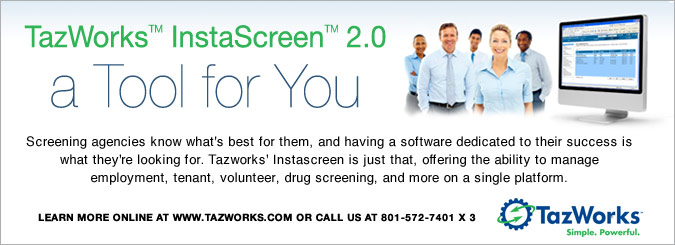

| BACKGROUND
SCREENING NEWS continued |
Research
Reports that Youth Offenses, Sentences, Predict Little about
Recidivism
Data emerging
from a seven years' study of young offenders suggest that the
nature of a serious juvenile crime or the length of time served
for it, does not do a very good job predicting if a youth will
re-offend. "Burglars are not all the same, neither are car thieves
or assaulters," said Edward Mulvey, professor of psychiatry
at the University of Pittsburgh. "Just because they've done
a certain type of offense doesn't mean they're on a particular
path to continued high offending or more serious offending."
"The way
you code a presenting offense, you can do it violent or not
violent, property or not property, you can do it a lot of ways;
it never comes out as a real strong predictor of outcome," Mulvey
said, explaining some of his latest analysis. Once a juvenile
is in state custody, the length of stay appears to have nothing
to do with the recidivism rate, said Thomas Loughran, of the
University of Maryland's Department of Criminology and Criminal
Justice. He worked on that issue with the Pathways data by comparing
two similar groups of youth. "The more [time] we gave them,
it didn't make any difference, there was no effect" on recidivism,
he reported, though cautioning that the bulk of the kids in
the study served between three and 13 months.
Further,
Loughran said his numbers show "no significant difference" in
the re-arrest rate for offenders who served probation versus
detention.
To read
more, click
here

New
FCRA Forms Will be Required by January 1, 2013
The Consumer
Financial Protection Board (CFPB) recently issued regulations
that call for the modification of three critical forms required
by the Fair Credit Reporting Act (FCRA), which are typically
used in the background
screening
process. The regulations require that employers and affected
consumer reporting agencies (CRAs) begin using these new forms
by January 1, 2013. In particular, the CFPB has modified three
specific forms to make clear that that the CFPB is the agency
from which consumers may obtain information about their rights
under the FCRA, not the Federal Trade Commission (FTC). The
three forms to be modified are: 1) Summary of Consumer Rights
under the FCRA; 2) Notice to Users of Consumer Reports of their
Obligations under the FCRA; 3) Notice to Furnishers of Information
of their Obligations under the FCRA. Employers and CRAs are
well advised to keep abreast of the FCRA's requirements and
the CFPB's rulemaking and enforcement.
To read
more, click
here

Must
All Employers Check Applicants Against a Terrorist List Before
Hiring?
While the
short answer is no, there is a bit more to this question that
employers should consider. Under the U.S. Treasury Department,
the Office of Foreign Assets Control (OFAC) administers and
enforces economic sanctions against certain countries and certain
individuals, such as drug traffickers and terrorists. To help
enforce these sanctions, the OFAC publishes a frequently updated
list called the "
Specially Designated Nationals ," or the
SDN list, which lists individuals, companies and other entities
that U.S. persons are prohibited from dealing with. Compliance
with these sanctions means all U.S. persons (which, by definition,
includes employers) cannot engage in any dealings with these
countries or individuals, including hiring individuals on the
list. Therefore, while checking the list is not specifically
required, hiring someone on the list is prohibited.
So, shouldn't
all employers check the list? Not necessarily. While this decision
should be made with the guidance of legal counsel, the employers
must address the following concerns.
Many background
checking companies offer an add-on service to check not only
the SDN but various other lists, such as those compiled by the
United Nations, Interpol and the FBI. Employers should know
what lists will be checked and how best to use that information
in their hiring practices.
To read
more, click here (may require SHRM membership
to access)

Rental Protection Agency Launches New Alias Trace Technology
for Tenant Screening
Rental Protection Agency (RPA) announced their latest
alias trace technology for background checks and tenant screening.
The new screening service allows landlords to accurately verify
tenants through advanced alias matching algorithms that identify
possible name changes, fake names, and married/divorced names.
This change brings a higher standard to online background checks
as it provides similar results a private investigator would
take weeks to find. RPA offers resources to assist landlords
in making informed decisions about their tenants and utilizes
the latest technology to provide more accurate data to landlords
and apartment complexes anywhere in the U.S. Screening potential
tenants is a commonly overlooked process by smaller landlords
and ends up being one of the riskiest decisions for rental properties.
One bad tenant can cost landlords thousands of dollars in lost
rent, legal fees and stress.
To read more, click here

| Welcome
to the U.S. Legal Challenge Question! |
Sponsored By:


As the background
screening industry continues to get more competitive the firms
that will ultimately succeed will be those that create competitive
advantage through their people by offering continuous learning
opportunities to heightened their knowledge and capabilities.
We believe that having employees that are very knowledgeable about
the legal landscape of background screening is essential to continued
success.
We are grateful
to Ann Cun, Counsel and Principal Editor at LawLogix,
Inc for providing the expertise for this valuable endeavor.
For information regarding the answers to the Legal Challenge Questions,
please contact Ann Cun, Counsel and Principal Editor, LawLogix
Group, Inc. at (602) 357-4240 and for more information about LawLogix
e-verify and immigration support services please visit www.Lawlogix.com
Please choose your
answer by clicking on it:
| TENANT
SCREENING NEWS (continued) |
Tenant
Screening News
In response
to requests from housing advocacy groups, HUD has published two
letters providing guidance to both managers of public housing
and managers of private, federally assisted housing. The first
letter, dated June 17, 2011 is written to public housing authorities.
Click Here to read this letter from
Secretary Shaun Donovan. The second letter, dated March 14, 2012
addresses private owners, managers and agents of HUD-assisted
properties. Click Here to view that letter.
Both letters
provide definition to what criminal offenses automatically disqualify
an applicant for public housing assistance; yet they encourage
PHA's and landlords alike to afford applicants a "second chance"
whenever possible. The letters seem to indicate a shift from guidance
documents set forth under previous administrations.
To
read the Second letter click
here

CoreLogic®
Launches MyRental.com To Help Independent Landlords Lower Tenant
Risk
CoreLogic,
a leading provider of information, analytics and business services,
today opened online access to comprehensive tenant screening
data for independent landlords with the launch of MyRental.com.
The new service provides the same applicant rental histories,
eviction data, and criminal reports to small landlords who rent
properties independently as those large apartment complexes and
property management companies use to mitigate renter-applicant
risk. Where services like these previously seemed cost prohibitive,
the rates as low as $10 per assessment-with no minimum and no
sign-up fee-MyRental.com gives independent landlords managing
a small number of properties a way to cost-effectively compete
for high-quality tenants while reducing their exposure to risk.
"The recent
growth in U.S. rental households is sparking demand for risk management
tools tailored for independent landlords," said Tim Grace, senior
vice president of data & analytics product management at CoreLogic.
"Previously, small landlords relied on their instincts, a few
documents, and applicant-supplied character references to assess
rental applicants. Now they have a tool to limit uncertainty and
accelerate decision-making with more reliable information to qualify
renters."
To read more
click
here

The
Merits of Doing Background Check During Tenant Screening
When you
do a tenant background check, you are able to track their tenancy
history. From eviction histories alone, you'd be able to tell
if a prospective tenant is going to be an asset or a liability.
But, you also have to be aware that laws restricting what you
can and cannot do when doing background check differ from state
to state. Also, there are federal laws prohibiting landlords or
landowners against discrimination. Thus, you cannot disqualify
an applicant because of his/her religion, sex, nationality or
age.
Another reason
to do a tenant
background checks during tenant screening is that you'd be
able to avoid the woes of bad tenants - from those who don't pay
to those who can do extensive damage to the property. If you are
thinking how tedious it would be to do a check on one person alone,
then think of how tedious it would be to replenish destroyed or
vandalized furniture or to remodel the entire property.
A single
background check will also help you know whether a future tenant
has a good tenancy history. Can
he/she pay
the rent regularly? You have a red flag when records show that
a person have a lot of charge offs and late
payments from former landlord or even other credit facilities.
To read more,
click
here

California
(Surprisingly) Becomes First State to Take a More Balanced Approach
to Social Media "Password Protection" Laws
California's
legislature has sent to the governor for signature the nation's
third "password protection" law. Unlike the preceding Maryland
and Illinois laws, California's pending statute takes into account
employers' legitimate business interests by not imposing a blanket
prohibition on all employer requests for personal social media
login credentials. In this way, California's bill adopts a more
balanced and reasonable approach, which also permits employers
to request that an employee divulge personal social media believed
to be relevant to an investigation of allegations of employee
misconduct. However, this exception does not apply to job applicants.
In addition, employers remain barred from asking current employees
to disclose their social media login credentials or to permit
the employer to "shoulder surf."
To read more, click here

Dollar
General's Use of Criminal Background Check Faces EEOC Scrutiny
Tennessse-based
Dollar General Corp. says it could be hit with an Equal Employment
Opportunities Commission (EEOC) lawsuit over the retailer's criminal
background check policies. The EEOC has alleged that the company's
criminal background check policy has a "disparate impact" on black
job candidates and employees, a violation of the Civil Rights
Act of 1964. Dollar General Corp.'s policy, "excludes from employment
individuals with certain criminal convictions for specified periods,"
according to the company's filing. In general,
the EEOC considers broad blanketed exclusions on any individuals
with an arrest or criminal history to be in violation of federal
law. The EEOC recommends companies review and revise their background
policies and take into consideration the nature and gravity of
the offense, the time that has passed since the conviction and/or
completion of the sentence, and the nature of the job sought in
order to be sure that the exclusion is important for the particular
position.
To read more, click
here


Facebook
Privacy Protection Bills Pass New Jersey Senate Committee
In New Jersey,
a bill to protect the privacy of job seekers has passed through
a Senate committee and now moves to the full Senate for a vote,
NJ 101.5 reports. S-1898 would prohibit employers from
requiring applicants to provide passwords or access to private
online accounts. Co-sponsor of S-1898 Sen. Kevin O'Toole (R-40),
said ". "By no means should an employer be able to forcibly access
such a broad scope of personal information against an applicant's
will. There are plenty of other steps in a job application process
for employers to gain a profound understanding of an applicant's
experience, fitness and personality."
In June,
the New Jersey Assembly
passed a similar bill.
To read
more, click
here

U.S.
Supreme Court to Hear Case About State Drivers License Agencies
Selling Personal Info
The U.S.
Supreme Court has agreed to hear a case in which a driver's license
agency sold information about drivers such as home address, name
and age. Several states including Florida have been selling DMV
records, either
under the
cloak of freedom of information or to help support the state's
falling revenues.
While on
the surface this case does not deal directly with background screening
practices it may have implications worth keeping an eye on. This
case deals with three South Carolinians who objected to solicitations
from lawyers to join a lawsuit against car dealers. At issue is
whether lawyers may use information gleaned from South Carolina
driver records, which they obtained by filing open records requests.
A federal law aimed at protecting driver records has an exception
for lawsuits and the court will determine whether the lawyers'
actions qualify.
Similarly,
in another case in Florida, Kehoe v. Fidelity Bank, the 11th Circuit
Court of Appeals has reversed a lower court and held that individuals
suing to recover for violations under the Drivers Privacy Protection
Act do not need to demonstrate actual harm in order to recover
monetary damages. The American Civil Liberties Union of Florida,
has submitted an amicus brief in the case arguing that individuals
are entitled to damages under the law when businesses or data
brokers intentionally access motor vehicle information. For more
information, see EPIC's Kehoe v. Fidelity Page. (Sept. 1, 2004)
So far, Florida
has sold more than 3 million names and addresses to marketing
companies and data-mining companies such as Lexis Nexis which
often produce reports about you without your knowledge or ability
to contest the accuracy of the information and is used for background
check by Insurance companies when handling claims, and by employers
who are considering hiring you.
To read more,
click here

Qualified
Privilege for Reference Statements, September 2012
The following
31 states have qualified privilege laws for references provided
in good faith:
|
- AK |
- GA |
- IA |
- MD |
- NM |
- OK |
- TN |
- WI |
|
- CO |
- HI |
- KY |
- MA |
- NV |
- OR |
- TX |
- WV |
|
- DE |
- ID |
- LA |
- MO |
- NY |
- PA |
- UT |
- WY |
|
- FL |
- IL |
- ME |
- NC |
- OH |
- RI |
- VA |
|
While some
states offer an "absolute" privilege, most offer a qualified privilege,
and that means, typically, that the privilege is lost if reference
statements:
- Are knowingly
false
- Are not
made "in good faith"
- Are made
with malicious intent
- Are made
with "reckless disregard for the truth"
- Are made
in violation of a nondisclosure agreement
- Contain
information that is confidential under law
Many states
also require that the request for a reference be made by the employee
or prospective employer, and some states require that the request
and/or the reference be in writing.
Source:
http://hrdailyadvisor.blr.com/archive/2012/03/19/HR_Policies_Procedures_References_Immunity.aspx

Legal Hot Water in Giving a Bad Reference
In cases where an employee's contract was terminated
for performance issues, it is unlikely HR would then provide a
positive reference when contacted by any future employers. Yet,
according to one workplace lawyer, providing a so-called 'kiss-of-death'
style reference may be a ticket to legal hot water, including
possible accusations of defamation, misrepresentation or an invasion
of privacy. "Intentionally providing inaccurate information about
someone or withholding critical information about an employee
could land you in trouble with a claim for misrepresentation from
the new employer with the potential to seek compensation for damages,"
Peter Ferraro, senior associate for Harmers Workplace Lawyers
said. Ferraro recommends that if employers or HR are going to
provide a reference, stick to the basic facts. In cases where
HR may wish to provide a character reference, it should be done
cautiously as there is potential to be held liable for defamation
if an unfavorable reference meant someone didn't get a job. As
a general rule of thumb, if in doubt, don't provide a written
reference.
To read more,
click
here

STOP
STRUGGLING WITH WRITING AND PUBLISHING YOUR NEWSLETTER: |

We can help
you have a high quality e-newsletter to help nurture your relationship
with your clients and attract new clients. Our customized newsletter
service will take over your newsletter task or create a new one
for you. We can manage the creation of your newsletter for you.
We are constantly
researching information to use for The Background Buzz and
you can put our research to use for you. Using the information
rich content from The Background Buzz (minus the ads
and competitors information) we will create a custom newsletter
for you.
Use your staff’s
time to do more valuable work and save all the hassle of researching
or writing articles, formatting and managing all the other ezine
tasks with our customized ezine process.
Contact Barry
Nixon at 949-770-5264 or at wbnixon@aol.com
for more information.

Innovative Enterprises Announces Integration
Of Services With Imagination Technologies' FRS™
Screening Technology Platform
Innovative
Enterprises, Inc., a strategic partner to the background screening
industry and expert provider of court
research
information products, smart data solutions and ancillary services,
today announced the upcoming integration of its core suite of
services with Imagination Technologies' Flexible Research System,
'FRS'. Once completed early this fall, the integration will provide
users of FRS technology with secure, seamless connectivity to
a number of best-in-class screening solutions, greatly enhancing
the quality and value of the services they provide to their trusted
clients.
Solutions
to be made available on FRS include the National Criminal Information
Scan®, the industry's leading multi-jurisdictional criminal
search solution; OffenderScan™ sex offender screening; Sentinel™
watch list screening; AssuredTenant™ comprehensive resident
screening; the Innovative Medical Solutions™ product suite
including I-MED™ levels 1, 2 and 3; the Innovative Credentialed
Practitioner Database™; the Innovative Provider Licensure
Database™ and the Innovative Provider Observation Database™.
FRS users will also gain access to real-time
arrest information
through FirstAAlert™ as well as NCIS-FirstAAlert™,
the most comprehensive examination of historical and real-time
multi-jurisdictional records available in the commercial background
screening industry.
To read more
click here

Tazworks Background Screening Software Interfaces With Icims,
The Leading Provider Of Talent Acquisition Software Solutions
TazWorks
LLC, a web-based background screening software company, announces
integration of their InstaScreen Premiere 2.0™ screening
application with a leading Software-as-a-Service (SaaS) talent
acquisition software provider, iCIMS. The integration enables
Background Screening Agencies to combine the power of TazWorks
InstaScreen Premiere 2.0™ with iCIMS, the leading provider
of talent acquisition software solutions for businesses of all
sizes.
TazWorks'
revolutionary Standardized Data Exchange Gateway makes it easy
to integrate background checks from InstaScreen Premiere 2.0™
into Third-Party Applicant Tracking Systems (ATS) and Human Resource
Management Systems (HRMS). Integration improves turnaround, lowers
costs, increases data security, and
reduces human
error, allowing for a healthier bottom line. "This iCIMS integration
adds another very exciting sales opportunity for our background
screening agency clients." said Barton Taylor, Founder of TazWorks.
"Employers utilizing the iCIMS Talent Platform will be pleased
with the ease of ordering a background check from within the iCIMS
platform, enabling TazWorks' background screening agencies to
attract new employer clients and build customer loyalty."
To read more
click
here

LawLogix
Ranked by Inc. Magazine as One of America's Fastest Growing Companies
For Sixth Consecutive Year
LawLogix
Group, Inc., the leader in
I-9 Compliance, E-Verify
and Immigration Case Management Software , announced today
that it is one of America's fastest growing companies, according
to Inc. magazine's 31st annual Inc. 500|5000 list. LawLogix, the
only stand alone vendor in the I-9 and E-Verify management space
to be included in rankings, was selected because of its outstanding
year over year revenue growth.
"We are thrilled
to be ranked as one of America's fastest growing companies by
Inc. magazine," said Dan Siciliano, Co-founder of LawLogix. "The
rankings validate our strong revenue and customer growth as well
as leadership position in the I-9, E-Verify Software as a Service
space."
"As the only
I-9, E-Verify and Case Management provider ranked on this prestigious
list, we believe this unequivocally demonstrates our market leadership
position and confirms that LawLogix is the company that human
resource managers and immigration practitioners have come to trust,"
said Javier Rey, LawLogix Vice President of
Sales and
Marketing. "Even law firms that once shied away from cloud offerings
are now leaving their antiquated systems and embracing our case
management technology."
To read more, click here .

Neeyamo Enterprise
Solutions (P) Ltd. Recognized as “Star Performer”
and “Major Contender” by Everest Group in its Multi-process
Human Resource Outsourcing Report
To read more,
click
here

BRB
Update
Sponsored by:
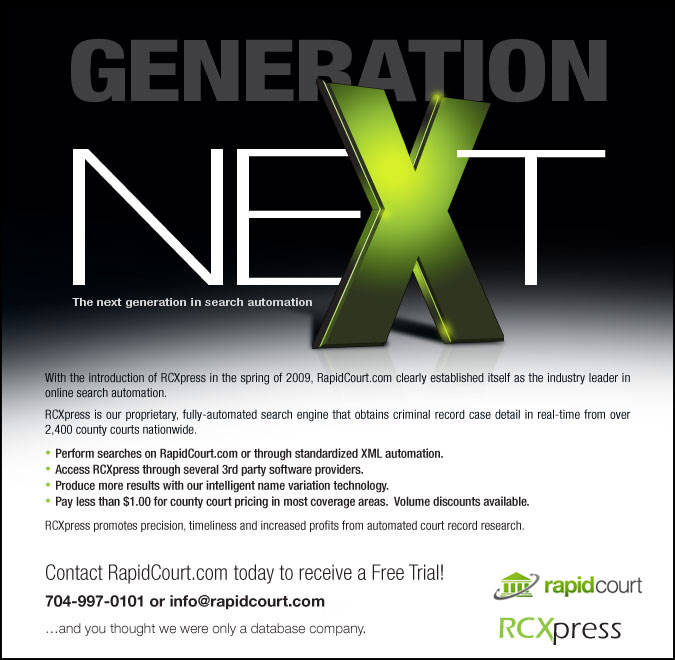
BRB
Update
By Mike Sankey, PRRN
Safe
Hiring Manual Author Attorney Lester Rosen Updates Book for New
Expanded Second Edition
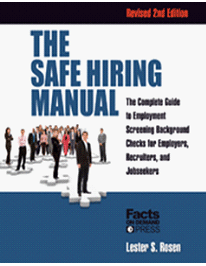 Attorney Lester Rosen, the
Founder and CEO of Employment Screening Resources (ESR) who "wrote
the book on background checks," has authored a new updated
and expanded second edition of his comprehensive handbook on background
screening, 'The Safe Hiring Manual - The Complete Guide to Employment
Screening Background Checks for Employers, Recruiters, and Jobseekers'
(Facts on Demand Press). The 736 page book, which will be published
in October 2012, includes new chapters on the April 2012 Equal
Employment Opportunity Commission (EEOC) Guidance on criminal
records and social media background checks. Attorney Lester Rosen, the
Founder and CEO of Employment Screening Resources (ESR) who "wrote
the book on background checks," has authored a new updated
and expanded second edition of his comprehensive handbook on background
screening, 'The Safe Hiring Manual - The Complete Guide to Employment
Screening Background Checks for Employers, Recruiters, and Jobseekers'
(Facts on Demand Press). The 736 page book, which will be published
in October 2012, includes new chapters on the April 2012 Equal
Employment Opportunity Commission (EEOC) Guidance on criminal
records and social media background checks.
"This second edition of 'The Safe Hiring Manual' is intended
to be the most all-encompassing and up to date guide to background
checks for employers," explains Rosen, who completed a prior
revision to the manuscript in 2007 and also wrote a second book,
'The Safe Hiring Audit,' in 2008. "'The Safe Hiring Manual'
is a complete blueprint detail of how to exercise due diligence
throughout the hiring process."
'The Safe Hiring Manual' is an ideal tool for employers, Human
Resources, security professionals, private investigators, employment
law attorneys, and background screening firms.
For more information
and to order the book, visit:http://www.esrcheck.com/SafeHiringManual.php
| BRB's
FREE RESOURCE CENTER |
For the
MOST COMPREHENSIVE RESOURCE describing all access methods, restrictions,
fees, and search procedures on over 26,000 government and private
agencies visit the Public
Record Research System (PRRS-Web) . We provide the extensive
details and in-depth data you will not find doing a Google search!
|
CRA
HELP DESK.COM |

CRAHelpDesk
PO Box 27869
Tempe, AZ 85285
800-929-3811
Fax: 800-929-3810
mike@brbpublications.com
www.CRAHelpDesk.com |
Compliance
with the myriad of state laws is a complex subject
affecting CRAs and their clients. The State Rules
Register provides an uncomplicated explanation in
plain English of state laws for what is reportable
to the client, usable by the client, and the necessary
steps to take to be in compliance with state laws.
Also included are best practices, practical tips,
and ongoing notification when state and federal
laws change. Create your own matrix reports. Use
the special Resource Tabs of Guidelines and Special
Instructions.
See
www.CRAHelpDesk.com.
We
Help Consumer Reporting Agencies |
For
more information contact Michael Sankey at mike@brbpublications.com
or visit www.brbpublications.com/updates.aspx

One
Site! Many Suppliers! |
Looking
for the Top Suppliers in the Industry? Need to find a
new Supplier?
Visit our VENDOR
SHOWCASE which features suppliers to the
Background Screening Industry.
2012
Winter Edition of Suppliers to the Background Screening
industry Guide
Now Available!
Click
here or on image to get a copy

Contact
Barry Nixon at wbnixon@aol.com
for information on getting your firm listed in the Summer
Edition.

The
Fall Edition Coming Soon!



USCIS
Releases New E-Verify Enhancements
The
United States Citizenship and Immigration Services (USCIS)
has released its latest round of E-Verify enhancements,
which will go into effect immediately for all users of
the E-Verify web interface. It's important
to note that this latest E-Verify release only affects
those organizations (or agents) that access E-Verify directly
through a web browser and not those employers using an
electronic I-9 system. E-Verify now supports
the following browsers (in addition to Internet Explorer
6.0 and above): Firefox (version 3.0 and above); Chrome
(version 7.0 and above); and Safari (version 4.0 and above).
The USCIS has also added a new "Quick Audit Report" which
will allow companies to generate an Excel spreadsheet
of E-Verify case data for a particular time period and
state location. Perhaps the most significant change is
a new set of fields, which will automatically appear for
"aliens authorized to work" who present a Foreign Passport
with an attached I-94. Last but not least, the USCIS has
added a new Web-based tutorial and a new E-Verify User
Manual for Corporate Administrators.
To read more, click here



OSC
Instructs Employers Regarding Software Features
Nowadays,
it seems like the government is keen on keeping tabs on
evolving workplace technology, particularly software that
relates to the I-9 process. Software that automatically
enables or requests data may inadvertently allow employers
to more easily violate anti-discrimination provisions
of the Immigration and Nationality Act (INA) 8 USC §
1324b.
The
warnings are clear and quite generous: Employers should
carefully vet their software systems for all aspects related
to employment eligibility verification to ensure well-meaning
software vendors do not inadvertently place additional
risks onto employers.
The
danger with well-meaning functionality in software is
that software developers are not necessarily trained to
review the software functionality for compliance with
U.S. immigration laws. Because employers are essentially
"on the hook" for the non-compliance of the software they
select and utilize, it's imperative for employers to truly
conduct a thorough evaluation of their I-9 software or
any software that integrates an I-9 component.
Before
the new I-9 Form becomes finalized, now is actually a
good time for employers to consult with experienced legal
counsel in evaluating existing or future I-9 software
solutions, especially if payroll or other HR systems are
incorporated into the I-9 software in light of the recent
OSC advisories.
To read more, click here

Tale
Signs Your I-9 Non-Compliance Warrants Criminal Defense
Counsel
Since
2009, the realm of immigration compliance for employers
has been dominated by administrative
I-9 audits. With each wave of audits, some may have been
lulled into believing that the worst thing that could
happen is the loss of undocumented workers and the payment
of fines. The complacent may have forgotten that, from
2006 through 2008, the U.S. Immigration and Customs Enforcement's
primary enforcement methods were covert criminal investigations
and prosecution of felony harboring of immigrant workers
and related charges.
ICE
is still in the criminal enforcement game when it comes
to worksites. ICE may even be in the process of bypassing
I-9 audits and increasing its utilization of covert operations
to directly seek asset forfeitures, as recently reported
in a case involving hotel owners in the Kansas
City area . Although none of these incidents will
gain a fraction of the press the Swift or IFCO raids generated
in 2006, each is a reminder that employers and immigration
compliance counsel must remain vigilant and more than
a bit wary. To that end, an employer may be on ICE's criminal
investigation radar during these tell-tale signs:
To
read more click here

|
White
Paper From HR Marketer

White Paper Social Influence:
Thriving in a New World of Media Relations
Social media
has created a world of dizzying potential: it's incredibly easy
to share your news with press, analysts, and decision-makers.
Yet media relations is tougher than ever! As the pendulum swings
from print to online media, the traditional roles of journalists
and analysts are merging into a community of bloggers, HR professionals,
consultants and other influencers.
To
download the free white paper click here

Manpower
Report Finds Positives in Global Market Outlook
According
to the Manpower Global Employment Outlook
Survey for the fourth quarter of 2012, employers
in the world's seven largest economies report that their hiring
levels will remain positive through the end of 2012. The survey
found that businesses in 22 labor markets around the globe expect
to have improved or relatively stable hiring plans for the final
three months of 2012 when compared to the previous quarter. But
hiring will be at a slower pace when compared to the fourth quarter
of 2011 and the first nine months of 2012. Although the pace of
hiring is expected to weaken in 26 markets compared to the same
period in 2011, the overall hiring outlook for most labor markets
included in the survey remains positive.
"If the uncertainties
of the debt crisis in Europe, a slowdown in China, the U.S. presidential
election and health care
costs keep
building, we will see the global labor market's slow, steady hiring
mode shift to a pause," said Jeffrey A. Joerres, chairman and
CEO of ManpowerGroup, in a press release. "I think that we're
seeing the beginning of that in the data for India with employers
not shedding staff, but downshifting hiring until they see more
positive signals. On the other hand, in the U.S., employers remain
confident enough to maintain the same steady hiring pace seen
over the past year."
To read more,
click here

Privacy
in the Global Village
In the ever-changing
world of privacy and data protection, global diversity is proven
every day by fascinating developments taking place in every corner
of the planet. At the same time, a common pattern can be seen
in many of those developments: their attempt to strike the right
balance between the exploitation and the protection of the most
valuable asset of our time. The most veteran jurisdiction in this
area of law in Asia, Hong Kong, has just had a revamp of its 15-year-old
Personal Data (Privacy) Ordinance, which toughens the existing
regime. In South Korea, the Personal Information Protection Act
has only been in force for a few months but is already being branded
as the toughest in Asia. The rest of Asia is not standing still
either as countries like Malaysia, Singapore and the Philippines
are also making progress in this area. This particular issue is
one that concerns global organizations seeking to adopt a coherent
and consistent methodology for compliance in respect of data flows.
The European approach to international data transfers is intimidating
to say the least, so it is understandable that those organizations
that are investing in programs that want to take advantage of
that solution on a truly global scale.
To read more, click
here
Call
for Criminal Background Checks on Parent Volunteers at Schools
Child protection
campaigners are calling for parents who volunteer in school or
for after school activities to be subject to mandatory child safety
checks. The Bravehearts child advocacy group has made the call
as part of a plan to make Australia the safest place in the world
to raise children. The call follows the release of a report card
on child protection policies across the states, which has ranked
the Australian Capital Territory (ACT) and Tasmania the worst
for child safety. Criminologist Carol Ronken from the Bravehearts,
said there are three piers to preventing child sexual assault:
educate children about personal safety, empower
and train adults to respond, protect in terms of legislations
and policies. In ACT and Tasmania, Ronken expresses a stronger
need for legislation addressing child sexual assault and more
emphasis on personal safety education within their curriculums
and schools. Also as part of the push to improve child safety
in schools, Bravehearts wants criminal background checks to be
done on parents who volunteer at school activities, child care
centers and sporting clubs.
To read more,
click
here

The
House of Representatives Approves Sweeping Changes To The Privacy
Act
Attorney-General
Nicola Roxon said the changes would give power back to consumers
over the way in which organisations used their personal information.
They would simplify credit reporting and strengthen enforcement
powers of the Privacy Commissioner, who would be able to apply
for civil penalty orders of up to $220,000 for individuals and
up to $1.1 million for companies. However, a Labor-dominated House
of Representatives committee said the proposed changes were so
complex stakeholders found them difficult to understand.
A report
by the standing committee on social policy and legal affairs said
the amendments were intended to reduce
complexity,
but the committee was concerned by "the number of submissions
that suggest significant confusion around the new provisions".
It called for an education program because it was worried about
whether the public would be able to easily understand new privacy
rights and obligations.
To read more,
click here (complimentary registration required)
Foreign
Professionals Wanted in Brazil
The Brazilian government is looking at ways to relax immigration
rules to attract up to 10 times more skilled foreign professionals
into the country to spur growth. Despite being
the world's sixth largest economy, Brazil is currently facing
a talent deficit as companies struggle to find qualified workers
to ramp up their operations. In the past, Brazil had waves of
immigrants arriving from all over the world. However, the economic
woes of the second half of the century led to a drastic slowdown
of foreigners. Today, foreigners represent just 0.3% of Brazil's
workforce, much lower than the figure of 7% at the beginning of
the 20th century. Business leaders also complain that Brazilian
bureaucracy makes it difficult and expensive to hire foreigners.
In order to hire professionals from other countries, firms must
first prove they were unable to find suitable local workers. They
are also required to train Brazilians to eventually replace the
foreign employees. Foreigners themselves face countless barriers
and red tape - getting a temporary identity card can take more
than six months.
To read more, click
here
Privacy
Policies Lacking In Ontario
The loss of personal information belonging to millions
of Ontario voters earlier this year shows that even good privacy
policies can be useless if they're not followed. Canada's
Information and Privacy Commissioner, Ann Cavoukian, released
a new report that calls on organizations to beef up the enforcement
and understanding of their privacy policies after the breach.
In April, Elections Ontario discovered a major privacy breach
when two memory sticks containing the names, addresses and birthdates
of some 2.4 million voters were lost. The information also indicated
whether they voted in the last election. Cavoukian previously
found that the staff who lost the USB keys didn't encrypt the
files because they didn't know what encryption meant. Her report
makes seven recommendations to improve privacy protection at any
organization, including developing privacy education and awareness
training programs. It also says organizations should have a protocol
in place to deal with a possible privacy breach that includes
notifying affected people as soon as possible.
To read more,
click
here

There
Is An Urgent Need For Greater Fairness And Clarity In The Police
Background Check Process
Canadian
Civil Liberties Association calls for standards that would prohibit
the release of information other than convictions, except in rare
circumstances. It also says non-conviction records should be reviewed
regularly and destroyed where warranted. It also says individuals
should have a right to be notified on the information in their
file and be able to appeal it before an independent adjudicator.
While there
are laws governing the release of certain information, such as
under the Privacy Act and the Youth Criminal Justice Act, the
report says there are no set standards for what police services
can or can't collect and release in police checks. It calls the
situation across Canada "a patchwork" of policies that may violate
Canada's
Charter of
Rights and Freedoms.
The report
says the problem is particularly acute in Alberta, where it says
there is too much discretion is left to individuals in police
services as to what information can and should be retained and
released.
To read more,
click
here
Proposed
New Privacy Law Open for Comment
A draft data
protection bill aimed at regulating data collection and use by
organizations in the public and private sectors has been released.
The Data Protection Bill 2012 would provide individuals with more
rights to access and control their personal data. A representative
of the Information and Communications Technology Authority said,
"Data protection affects everyone and the working group seeks
to present a comprehensive bill to Cabinet that suits the needs
of the Cayman Islands while meeting international standards."
Officials said that the members of the Data Protection working
group came up with a draft, which would not be over burdensome
on government or the private sector but at the same time promotes
best practice. Although the working group believes many businesses
and organizations will already be in compliance with the provisions
of the proposed legislation, the bill seeks to provide a minimum
standard for protection of personal data.
To read more, click
here
Cabinet
Approves Changes to Data Protection Draft Bill
The Executive Yuan in China has approved a draft bill
that seeks to address controversies arising from a 2010 amendment
to the Personal Data Protection Act. The bill will now be submitted
to the Legislature Yuan for final approval. One of the proposed
changes in the bill involves personal information gathered without
the knowledge or permission of the concerned individuals. The
collectors of this kind of data should inform the concerned individuals
before the information is processed or used. The 2010 amendment
stipulates that the collectors should inform the concerned individuals
within one year of the law's implementation, a requirement that
is considered difficult to implement. Partly because of this controversy,
the amendment was never put into force despite its promulgation
in May 2010.
To read more,
click
here

Courts Seal Youth Criminal Records
Beijing courts are preparing for the adoption of a new nationwide
criminal law next year, under which some convicted juvenile offenders
are to have their criminal records sealed, making it easier for
them to apply for jobs or further education. According to the
current Criminal Law, amended in 2011, most convicted criminals
must report their record when they apply to the military or for
a job. The new law would not require those who were under 18 when
they committed the crime, and were sentenced to less than five
years in jail or to a non-custodial sentence, to tell prospective
employers of their conviction, but the employer can still access
the record by applying to the police. Some argue this law change
is unfair to companies because such a person may be a security
risk, while others want to provide those who have corrected their
mistakes with a second chance.
To read more, click
here

Introduction
to China's Education System and Education Verification
Employers want to find people who are not only well
qualified with relevant education background, but also ethical.
Therefore, conducting an education background check should be
on employer's priority list, especially because a significant
amount of job applicants misrepresent their education background,
costing employers time and money to replace unqualified hires.
Some of those who don't have an advanced degree decide to resort
to false diploma when they start job hunting. That explains why
diploma mills or outright falsified diplomas are so popular among
jobseekers. Common ways to confirm a diploma's authenticity include
checking: the Higher Education Graduates Database in China - released
by Ministry of Education, the nation's trusted source for education
verification; the
China Academic
Degrees and Graduate Education Development Center (CDGDC) - an
organization with the independent qualification of legal entity
directly under the joint leadership of Ministry of Education and
the Academic Degrees Committee of the State Council (ADCSC); with
the university directly.
To read more,
click here
Commission
Decisions on the Adequacy of the Protection of Personal Data in
Third Countries
The Council and the European Parliament have given the Commission
the power to determine whether a third country ensures an adequate
level of protection by reason of its domestic law or of the international
commitments it has entered into. The adoption of a (comitology)
Commission decision involves: a proposal from
the Commission; an opinion of the group of the
national data protection commissioners (Article 29 working party);
an opinion of the Article 31 Management committee delivered by
a qualified majority of Member States; a thirty-day right of scrutiny
for the European Parliament, to check if the Commission has used
its executing powers correctly; and the adoption of the decision
by the College of Commissioners. This decision
would allow personal data to flow from the 27 EU countries and
three EEA member countries (Norway, Liechtenstein and Iceland)
to that third country without any further safeguard being necessary.
To read more,
click
here

Did
You Know?
To date,
the European Commission has recognized only a limited number of
jurisdictions (Andorra, Argentina, Canada, Faeroe Islands, Guernsey,
the Isle of Man, Israel, Jersey, Switzerland, Uruguay and the
U.S. Department of Commerce Safe Harbor Privacy Principles) as
providing an adequate level of data protection.
Source: http://www.huntonprivacyblog.com/2012/09/articles/article-29-working-party-issues-favorable-opinion-on-the-level-of-protection-of-personal-data-in-the-principality-of-monaco/
Article 29
Working Party Issues Favourable Adequacy Opinion
On July, 19, 2012, the Article 29 Working Party (the “Working
Party”) issued an Opinion finding that the Principality
of Monaco ensures an “adequate level of protection”
for personal data within the meaning of the European Data Protection
Directive (Article 25 of Directive 95/46/EC) (the “Directive”).
Under the Directive, strict conditions apply to personal data
transfers to countries outside the European Economic Area that
are not considered to provide an “adequate” level
of data protection.
To read more, click
here
More
Japanese IT Firms Seek Young Chinese Graduates
An increasing
number of Japanese firms, especially those in the IT sector, are
seeking young graduates from Chinese universities to join them.
Japan's HR service firm RGF recently organized a global
recruiting project for the Japanese IT industry called "Work in
Japan." RGF held a computer programming competition for graduates
from top universities in China, South Korea and India. It selected
a total of 92 graduates, which included 85 Chinese, from over
10,000 applicants and they were flown over to Tokyo for job companies
in Japanese firms. Japanese IT firms are aiming
to expand their global businesses and have strong demand for engineers
who are willing to work both in Japan and abroad because local
graduates are not enough to fill the gap. Chinese graduates are
valued not only for their high technical skills and real-work
experiences, but also stronger determination and Confucian work
ethics.
To read more, click
here
Personal
Data Protection Law Coming This Year
The Government will introduce a Data Protection Act
this year, which will regulate the use of personal information
compiled on Jamaicans. The Act will seek to protect the privacy
of individuals in relation to personal data and the regulation
of the collection, processing, storing, use and disclosure of
certain information relating to individuals. Ministry of Science,
Technology, Energy and Mining Minister of State Hon. Julian Robinson,
told the government recently that there is "a need for a more
uniformed, robust and clear mandate to protect privacy and personal
information." Robinson added that a position will be established
for a single information and communication technology regulator
within the next couple of years.
To read more,
click here
Sex
Offenders May Be Avoiding Detection
Sex offenders who have had their names suppressed could
be avoiding detection because their crimes do not have to be revealed
in their criminal records checks. The Ministry of Justice says
about 400,000 applications for criminal records were made last
year and the ministry is looking at the way its checks work to
make sure they are operating properly. Sex offenders are often
granted name suppression, because if they are a relative or are
known to their victim, exposing who they are could easily identify
the person they have abused. The ministry says both it and police
can provide information about people's criminal records. The ministry's
criminal record unit was set up to give people access to their
own information and they can share this with prospective employers,
but it should not be treated as a comprehensive security check.
It says an approved list of employers who work with children or
the elderly go through a police vetting procedure designed to
flag risks that cannot be disclosed by the ministry.
To read more, click here
ID
Card a Mandatory Document in the UAE
The UAE has
implemented a National ID card which will be mandatory to complete
any official transaction at almost all government departments
and organisations across the country by the end of this year,
a senior official said. "As part of the ID card being made a mandatory
identity document, the Emirates ID has distributed thousands of
electronic card readers to the government sector this year. "Our
efforts to distribute card readers to government organisations
will encourage more of them to adopt ID card as the mandatory
document for identification," Al Khoury said.
To read more,
click
here
Sex
Offender Doctors Still Allowed To Work
The GMC Chief
Executive, Niall Dickson, said:"Cases of doctors convicted of
sexual assault or child pornography offences are very rare and
in the vast majority of these cases these doctors are struck off
the medical register so they cannot practise medicine in the UK."
However, a spokesman for the Council said the decision on whether
to strike off a doctor was taken by an independent panel of experts.
Individual hospitals, however, can impose their own sanctions
on doctors.
An investigation
found that of the 31 licensed doctors with convictions for sex
offences, four have records of sexual assaults, four have been
convicted of child pornography offences, two committed voyeurism
or exposure offences and 21 solicited prostitutes or were caught
kerb-crawling.
To read more,
click
here

Data
Protection Notification: Is Your Organization Committing a Criminal
Offence?
Some organisations
may be falling foul of the Data Protection Act 1998 by failing
to notify details of their personal data processing to the Information
Commissioner's Office (ICO). Notification is a legal requirement
for every organisation that processes personal information (unless
they are exempt), and failure to comply with this obligation is
a criminal offence.
The (ICO)
maintains a public register of organisations that process personal
data, together
with details
about the types of personal information they process and the purposes
for
which they
process it. The register and each organisation's individual notification
are publicly available to view via the ICO website.
To read more,
click
here

Data
Protection During Recruitment: Top 10 Tips For Managers
Complying
with the Data Protection Act ("DPA") is increasingly a concern
for employers as failure to do
so brings the prospect of negative publicity and ultimately, significant
fines.
Personal
data is defined as information which relates
to a living person where that person can be identified
from the data either alone or in conjunction with other data held
by the employer. So, in
the context
of recruitment, a completed application form is likely to constitute
personal data. Some documents used during the recruitment process
(e.g. medical questionnaires, interview notes) may also contain
"sensitive personal
data." This
is information which relates, for example, to the person's race,
religion, political views, health information etc. Such data,
because of its nature, attracts a higher level of protection and
must be handled with particular care. The DPA requires all types
of personal data to be processed fairly and lawfully in accordance
with
the requirements
of the legislation.
With this
in mind, how should employers process personal data received during
the recruitment
process to
ensure that they are complying with the DPA? This article, suggest
10 "Top Tips" for dealing with personal data during the recruitment
process.
To read more,
click here
Uruguay
Achieves Adequacy in Data Protection
Uruguay has been declared adequate by the European Union regarding
Personal Data Protection. This recognition implies an approval
of the legal security provided by Uruguay, which improves the
flow of personal data between countries that have this distinction.
It also sets a significant milestone that confirms the approval
of regulations and national actions that guarantee the protection
of this fundamental human right, which is customary to any technological
and globalized society. Uruguay can now be seen as a country capable
of assuming the challenge of taking care of the adequate controls
that are required in the use and treatment of the personal data
that has been provided. This is an opportunity for increasing
businesses that involve or have as input the transfer of personal
data, since control is offered as a guarantee that will facilitate
interactions between countries.
To read more, click here
World
Information Center:

Featured
International Session at IAPP Europe Data Protection Congress
2012
Background
Checks: Hiring the Perfect Employee without Breaking the Law
Employers
use background checks to assess and verify the qualifications
and qualities of applicants. Increasingly, employers retain specialised
vendors to conduct background checks in order to supplement the
information available from an applicant's CV, references and interviews.
However, employers must take care to follow all applicable laws
when obtaining and using these reports. In many countries, an
employer must notify an applicant prior to conducting background
checks and may also need to obtain the individual's consent. This
session will review the types of information employers can, and
commonly do, seek about applicants and how employers and the third
party vendors engaged by them should go about collecting such
information. The session will also discuss the potential liabilities
associated with collecting other information, such as increased
exposure to discrimination claims.
Ann
Bevitt , Partner, Morrison & Foerster LLP
Carlos Garcia-Maurino , Senior Director Legal
- Data Privacy, Oracle

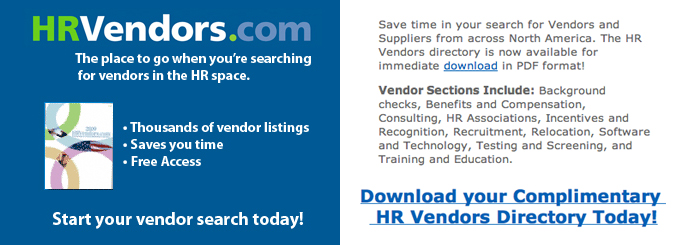

|
ADVERTISERS IN THIS EDITION |


|  |
|
|
| |
|
Background
Screening Jobs |
|
Visit
the Job Board for the Employment and Tenant Screening Industry.
Here you will find resumes of people with industry experience
and employers seeking applicants with experience in Employment
and Tenant Screening and related businesses.
www.backgroundscreeningjobs.com


|
UPCOMING CONFERENCES, COURSES & EVENTS |
2012
Events ( Click
Here to View full list of 2012 Events ) -
Updated Monthly
SHRM
State Conferences, visit
http://www.shrm.org/Conferences/StateAffilliateConferences/Pages/default.aspx
Drug
and Alcohol Testing Industry Association (DATIA), 2012 Training
Course Schedule, visit
http://datia.org
SAPAA
Training Institute Learning Events, http://www.sapaa.com/
CUPA-HR
Conferences: http://www.cupahr.org/
World
Federation of People Management Associations, Events,
http://www.wfpma.com/events/by-region#quicktabs-tab-view__events__page_3-4

|
 Bon Giurnu!
Bon Giurnu! Thanks to our Platinum Members
for joining us in the Fall edition of the Suppliers
to the Background Screening Industry Buyers Guide and
for helping us to sell out the Premium advertisements.
Thanks to our Platinum Members
for joining us in the Fall edition of the Suppliers
to the Background Screening Industry Buyers Guide and
for helping us to sell out the Premium advertisements.  To get an electronic copy of
the 2012 Annual Background Screening Industry Buyers
Guide click here or if you would like a hardcopy version
please email me at
To get an electronic copy of
the 2012 Annual Background Screening Industry Buyers
Guide click here or if you would like a hardcopy version
please email me at 


















